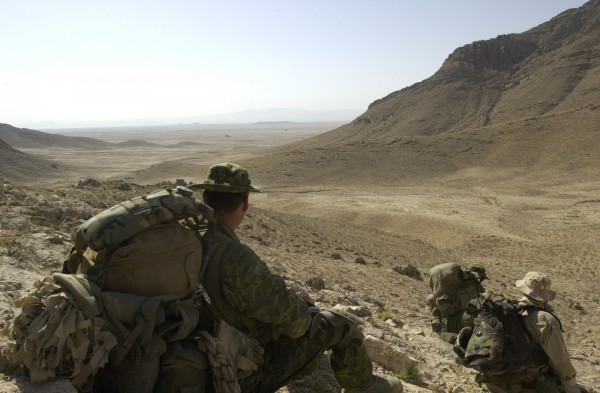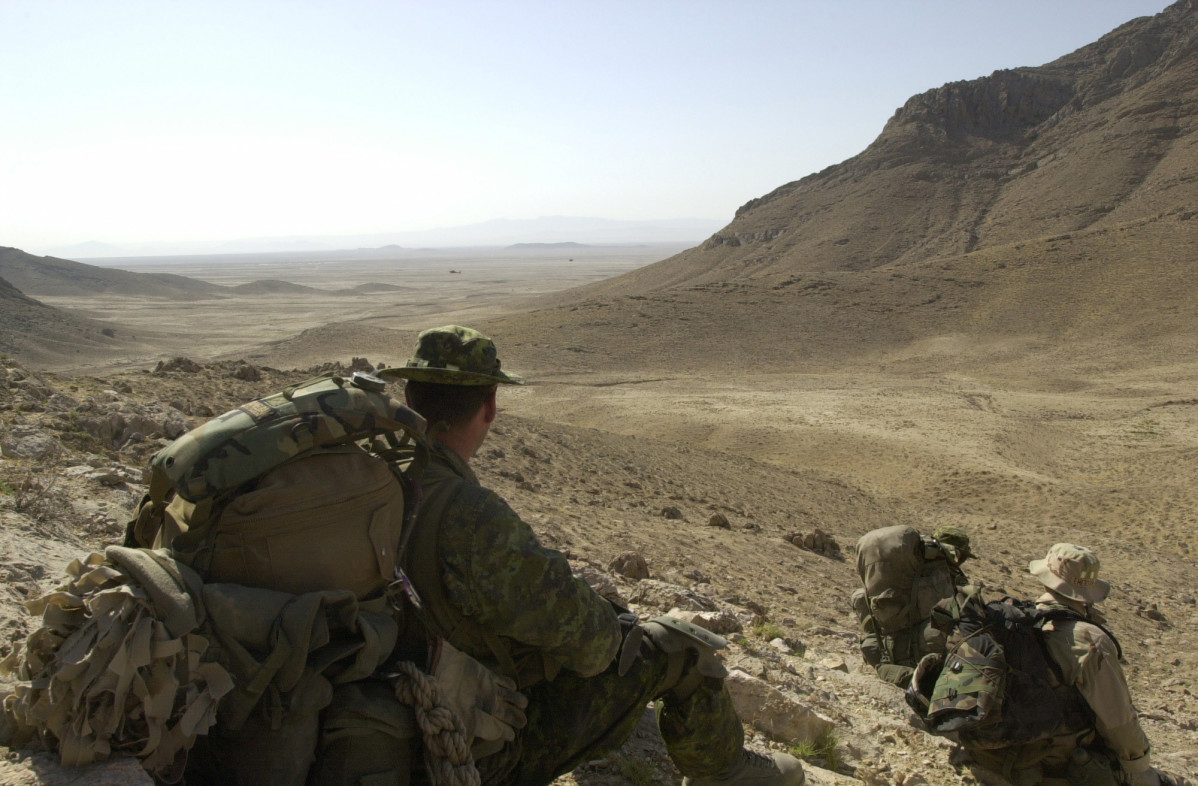We can denounce attacks like the ones in Ottawa and Quebec all we like, it would also be useful to understand them

Canadian soldiers from 3PPCLI take a break as they move into the hills to search for Al Queda and Taliban fighters after an air assault onto an objective north of Qualat, Afghanistan on July 1, 2002. (U.S. Army photo by Staff Sgt. Robert Hyatt)
The sight of our Parliament buildings under attack is a horrifying one. Sadly, it’s likely to rally support for the Harper government’s decision to send warplanes to attack Islamic State in Iraq. It shouldn’t.
Yes, there’s a strong temptation now to ramp up our anger and vow that we won’t back down until Islamic State is obliterated. And that kind of anger is very satisfying — even if it is exactly the response IS militants are aiming for in their quest to stoke up a holy war against the West.
But it is both wrong and counter-productive for Canada to be joining the U.S.-led attack on Islamic State — a continuation of George W. Bush’s foolish and failed “war on terror” project and of decades of Western military interventions that have turned the region into a hotbed of hatred against the West.
The killing of two soldiers in the past few days — on Parliament Hill and in Quebec — is tragic. Those responsible should be punished to the full extent of the law.
But our response should involve something more than just the familiar, easy denunciations of the horrors of Islamic State. Anyone not living under a pile of rocks already knows that Islamic State is barbaric.
What we don’t know are the reasons for this behaviour. We can denounce it all we like; it would also be useful to understand it.
For years, the pro-war right has suppressed any meaningful discussion of the “root causes” of terrorism, limiting our focus to the horrific nature of terrorist acts — particularly easy in the case of Islamic State — in order to rouse us to go to war against such violence.
Why are terrorists attacking the West? Because, as George Bush explained in a solemn TV address shortly after 9/11, “they hate our freedoms.” The possibility that they might actually hate us because of our military interventions in their countries has never really been permitted to be part of the public discussion.
Robert Pape, a political scientist at the University of Chicago and director of the Chicago Project on Suicide Terrorism, wanted to study terrorism in a more systematic way. He put together a comprehensive databank which examines every one of the 2,200 suicide terrorist attacks in the world since 1980.
Pape, who previously taught at the U.S. Air Force’s School of Advanced Airpower Studies, concludes that such attacks almost always “have a specific secular and strategic goal: to compel modern democracies to withdraw military forces from territory that the terrorists consider to be their homeland.”
Pape notes that since 9/11, the United States “has conquered and occupied two large Muslim countries (Afghanistan and Iraq), compelled a huge Muslim army to root out a terrorist sanctuary (Pakistan), deployed thousands of Special Forces troops to numerous Muslim countries (Yemen, Somalia, Sudan, etc.), imprisoned hundreds of Muslims without recourse … Yet Americans still seem strangely mystified as to why some Muslims might be angry about this situation.”
With the anti-IS campaign, Syria has now become the 14th country in the Islamic world to have been “invaded or occupied or bombed” since 1980, according to Andrew Bacevich, the George McGovern fellow at Columbia University’s School of International and Public Affairs. Yet somehow, we don’t connect Western military actions to terrorism — and the Harper government seems determined to keep it that way.
Last week, it put out calls for research that would “increase our understanding of terrorism, counter-terrorism and countering violent extremism.”
But the government posting said that factors commonly linked to terrorism — including “grievance and moral outrage” — rarely lead to violence. Instead, it wants to focus on the role played by the Internet in radicalization, as well as how terror groups form, how they use funds for recruitment, when and why they turn violent.
Conservative MP Daryl Kramp, chair of the Commons public safety committee, told reporters that the root of homegrown extremism is difficult to know — but he suggested “violent video games” as a potential trigger.
This resistance to probing root causes — a curious phenomenon in an educated society — is ostensibly about not wanting to suggest sympathy for the terrorists.
But probing root causes has nothing to do with sympathizing with terrorists.
In high school, I remember studying the “root causes” of World War II — one of which was the huge reparation sums the Allies forced Germany to pay after World War I, thereby creating a deprived and humiliated German population that was more susceptible to Hitler’s vengeful calls to reassert German power.
In explaining this background, my high school teacher was in no way sympathizing with Hitler, whose criminal responsibility for some of history’s worst crimes was never in question. The teacher was simply trying to help us to understand the world, and the historical forces that had led to the rise of such barbarism.
This desire to learn from history no doubt played a role in the Allied decision to not impose reparations on Germany after the Second World War, to instead spend billions through the Marshall Plan rebuilding it in the hope of re-integrating it into the world economy. As it turned out, that strategy worked.
Similarly, a serious consideration of Pape’s finding that foreign military intervention is the main cause of terrorism might logically lead to a decision to stop intervening militarily in these countries — something that the West should stop doing anyway, according to international law.
But as long as Harper is in power, we’ll keep our warplanes in the air and confine our probe of the roots of terror — even as terrorists are striking right in our midst — to a fruitless quest to link terrorism to the Internet … and to video games.
Winner of a National Newspaper Award, Linda McQuaig has been a reporter for the Globe and Mail, a columnist for the National Post and the Toronto Star. She was the New Democrat candidate in Toronto Centre in 2013. She is the author of seven controversial best-sellers, including Shooting the Hippo: Death by Deficit and other Canadian Myths and It’s the Crude, Dude: War, Big Oil and the Fight for the Planet. Her most recent book (co-written with Neil Brooks) is The Trouble with Billionaires: How the Super-Rich Hijacked the World, and How We Can Take It Back.
You can reach her at linda@lindamcquaig.com
The views, opinions and positions expressed by all iPolitics columnists and contributors are the author’s alone. They do not inherently or expressly reflect the views, opinions and/or positions of iPolitics. or The Dialog.
This article was originally published on iPolitics and is reprinted here with permission as part of the partnership between iPolitics and the Canadian University Press



